Science
Why fish don't exist : a story of loss, love, and the hidden order of life
Lulu Miller
590.92 /Miller
Biographies, History, Memoir, Philosophy, Science
Nineteenth-century scientist David Starr Jordan built one of the most important fish specimen collections ever seen, until the 1906 San Francisco earthquake shattered his life's work.
The anxious generation : how the great rewiring of childhood is causing an epidemic of mental illness
Jonathan Haidt
305.23 /Haidt
Nonfiction, Health, Science
"From New York Times bestselling coauthor of The Coddling of the American Mind, an essential investigation into the collapse of youth mental health--and a plan for a healthier, freer childhood. After more than a decade of stability or improvement, the mental health of adolescents plunged in the early 2010s. Rates of depression, anxiety, self-harm, and suicide rose sharply, more than doubling on most measures. Why? In The Anxious Generation, social psychologist Jonathan Haidt lays out the facts about the epidemic of teen mental illness that hit many countries at the same time. He then investigates the nature of childhood, including why children need play and independent exploration to mature into competent, thriving adults. Haidt shows how the "play-based childhood" began to decline in the 1980s, and how it was finally wiped out by the arrival of the "phone-based childhood" in the early 2010s. He presents more than a dozen mechanisms by which this "great rewiring of childhood" has interfered with children's social and neurological development, covering everything from sleep deprivation to attention fragmentation, addiction, loneliness, social contagion, social comparison, and perfectionism. He explains why social media damages girls more than boys and why boys have been withdrawing from the real world into the virtual world, with disastrous consequences for themselves, their families, and their societies. Most important, Haidt issues a clear call to action. He diagnoses the "collective action problems" that trap us, and then proposes four simple rules that might set us free. He describes steps that parents, teachers, schools, tech companies, and governments can take to end the epidemic of mental illness and restore a more humane childhood. Haidt has spent his career speaking truth backed by data in the most difficult landscapes--communities polarized by politics and religion, campuses battling culture wars, and now the public health emergency faced by Gen Z. We cannot afford to ignore his findings about protecting our children--and ourselves--from the psychological damage of a phone-based life"--
This book was illuminating to say the least. As someone who is just beginning my journey into parenthood, as well as someone who part of the generation who had a mostly low-tech childhood, this book was an interesting and alarming deep dive into the the long-term effects of a "phone-based childhood." I work with children every day, and I easily see the differences as the years go by and we rely more and more on social connections and experiences via online versus in person, and the way it affects children is astounding. I think all parents should consider the concerns and calls to action suggested in this book, and rethink how they want to help frame the childhoods their children experience. I particularly hope that even as we lean more and more heavily on smart phones as a society, that we don't totally lose the emphasis on a play-based childhood to support healthy child development. Obviously I use my phone and connect online all day, but I really want to be conscious of the factors that come into play when parenting a child. -Mari
The triumphant rhinoceros
Jane Kurtz
j599.668 Kurtz
Kids, Nonfiction, Animals, Science, Travel
Captain Van der Meer turns an orphaned rhinocerous named Clara into a sensation, traveling all over Europe and changing how people think about her species. Based on a true story. Includes author's note.
Fascinating story with really cool illustrations about one Dutch sea captain's efforts to bring an exotic, exciting, never-before-seen rhino around to the people of Europe! -Anne W
Papilio
jE Clanton
Humor, Kids, Picture Books, Animals, Nature, Science
"Told in three parts, Papilio transforms from caterpillar to chrysalis to butterfly"--
There's a new very hungry caterpillar in town, Papilio! This collaborative picture book has just enough information for young entomologists to gobble up and features a sweet story about finding your wings. Papilio is one big treat! -Casey
The secret lives of numbers : a hidden history of math's unsung trailblazers
Kate Kitagawa
510.9 /Kitagawa
Nonfiction, History, Science
Mathematics shapes almost everything we do. But despite its reputation as the study of fundamental truths, the stories we have been told about it are wrong--warped like the sixteenth-century map that enlarged Europe at the expense of Africa, Asia and the Americas. In The Secret Lives of Numbers, renowned math historian Kate Kitagawa and journalist Timothy Revell make the case that the history of math is infinitely deeper, broader, and richer than the narrative we think we know.
I'm not even going to pretend that I understood everything in this book (and it's literally a book that just explains numbers and mathematics, you don't even have to do any!), but I found it full of interesting facts and tidbits nonetheless. The book is written in a very friendly fashion (math jokes, anyone?), and does a great service in highlighting brilliant people who made strides in the field of math, some of whom have been more or less lost to history because they didn't make it into the formal books. Eyeopening to the nth degree! -Candice
Atlas obscura : Wild life : an explorer's guide to the world's living wonders
Cara Giaimo
570 /Giaimo
Nonfiction, Animals, Nature, Science
"From the bestselling authors of Atlas Obscura and Gastro Obscura, comes Wild Life, an over-the-top, dazzling collection of the world's most fascinating, most unusual, and least-understood natural wonders. It's more than a field guide--it's an adventure. From the curious minds of Atlas Obscura, authors of #1 New York Times bestselling Atlas Obscura and Gastro Obscura, comes an unputdownable tour through the world's most extraordinary natural wonders and curiosities. Learn how dung beetles navigate by the stars and trees communicate through their roots. Meet one of the strongest animals in the world: the puny peacock mantis shrimp. Visit a 44,000 year old shrub, float along flying rivers, and explore a garbage dump teeming with endangered storks. There are first-person interviews: hear from a honey hunter and his avian partners, a scientist working to understand the hidden language of prairie dogs, an offshore radio DJ who is at the heart of the local fishing community. Examine old examples of bird song notation written on sheet music. Featuring over 500 extraordinary plants, animals, and natural phenomena with illustrations and photos on every page, first-person interviews, and engaging infographics, the book takes readers around the globe, with stops in every continent--from Arctic deserts to lush jungles, to the deepest fathoms of the ocean, and into the heart of our densest cities. In a time where the world that feels more knowable than ever, where can access anything with the click of a mouse or a swipe of a finger, and where nature documentaries are a dime a dozen, Wild Life finds a way to reinvigorate our send of wonder about the natural world"--
This book is gorgeous! I am the lucky cataloger who got to see this book before the labels were delicately affixed and it was placed on the Hold shelf. This book is perfect for the curious, for those who love indulging in wonder. Pick this book up if you want your mind to take a walk on the wild side. -Melody
The sixth extinction : an unnatural history
Elizabeth. Kolbert
576.84 /Kolbert
History, Science
Provides a moving account of the disappearances occurring all around us and traces the evolution of extinction as concept, from its first articulation by Georges Cuvier in revolutionary Paris up through the present day. The sixth extinction is likely to be mankind's most lasting legacy, compelling us to rethink the fundamental question of what it means to be human.
Who would have thought that humans might actually be the problem? Elizabeth Kolbert, apparently. "Sixth Extinction" is a compelling, eye-opening read about the human-led "sixth extinction" event taking place before our eyes. Part-history on the evolution of the scientific understanding of extinctions, part-commentary on the extinctions actively taking place, this novel forces readers to ask the question: "What will be humankind's lasting legacy?" -Madison C
The rise and fall of the dinosaurs : a new history of a lost world
Stephen Brusatte
567.9 /Brusatte
Nature, Science
A sweeping narrative scientific history that tells the epic story of the dinosaurs, examining their origins, their habitats, their extinction, and their living legacy.
For anyone who is still a child at heart and misses being asked what their favorite dinosaur is, "The Rise and Fall of the Dinosaurs" is the book for you! As someone who grew up wanting to be the next Dr. Alan Grant of paleontology, I can say with confidence that Steve Brusatte's book is the perfect fit for anyone fascinated by the wonders of paleontology and golden age of dinosaur discoveries. -Madison C
Into thin air : a personal account of the Mount Everest disaster
Jon. Krakauer
796.522 /Krakauer
Science, Sports
Journalist Jon Krakauer, standing on the summit of Mt. Everest, saw nothing that "suggested that a murderous storm was bearing down." He was wrong. The storm, which claimed five lives and left countless more in guilt-ridden disarray, would also provide the impetus for this epic account of the May 1996 Mt. Everest disaster.
A first-hand account of the 1996 Mt. Everest disaster, "Into Thin Air" almost reads like a fiction novel, exploring the small decisions and unavoidable moments that led to the loss of five lives on the Nepal-side of the mountain. For readers who are drawn to stories about surviving against the odds and the unrelenting will of the human spirit, "Into Thin Air" will take you on an unforgettable journey on a quest to reach the world's highest peak, and the costs along the way. -Madison C
The language puzzle : piecing together the six-million-year story of how words evolved
Steven Mithen
417.7 /Mithen
Nonfiction, History, Science
"The emergence of language began with the apelike calls of our earliest ancestors. Today, the world is home to thousands of complex languages. Yet exactly how, when, and why this evolution occurred has been one of the most enduring--and contentiously debated--questions in science. In The Language Puzzle, renowned archaeologist Steven Mithen puts forward a groundbreaking new account of the origins of language. Scientists have gained new insights into the first humans of 2.8 million years ago, and how numerous species flourished but only one, Homo sapiens, survives today. Drawing from this work and synthesizing research across archaeology, psychology, linguistics, genetics, neuroscience, and more, Mithen details a step-by-step explanation of how our human ancestors transitioned from apelike calls to words, and from words to language as we use it today. He explores how language shaped our cognition and vice versa; how metaphor advanced Homo sapiens' ability to formulate abstract concepts, develop agriculture, and--ultimately--shape the world. The result is a master narrative that builds bridges between disciplines, stuns with its breadth and depth, and spans millennia of societal development."--Inside flap.
If you're like me, you've often lain awake at night, wondering how language came to be. As in, how did we take that step (more likely, steps) from whoops and grunts and hoots to making sounds that were intentional and imbued with meaning, and how did we get others to agree on those sounds and meanings, and how did we spread this newfound amazing ability, and how did it evolve? And so on. If you've had these thoughts, this book is for you. -Candice


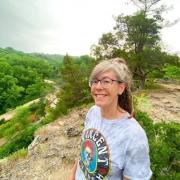
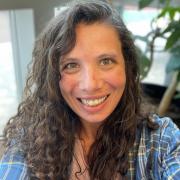
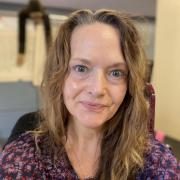
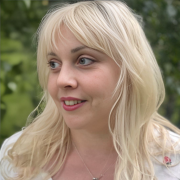
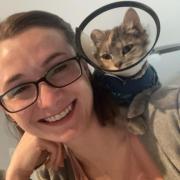
One of those books that fundamentally changed how I view the world. Highly relevant today with a liberating perspective on binary thinking and the human tendency to categorize and control chaos. -Annie